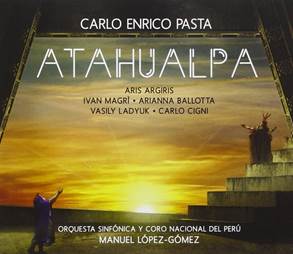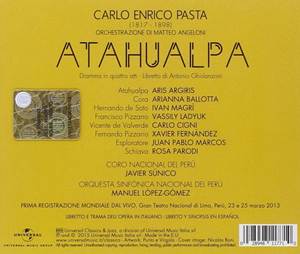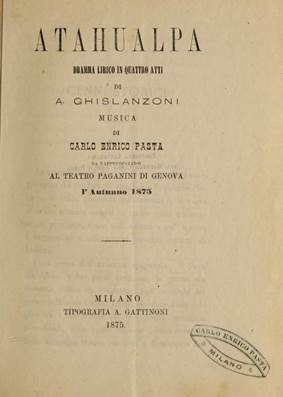

ATAHUALPA, an opera by Carlo Enrico PASTA


Universal 4811771 (2 cd's) 20 Euros
Carlo Enrico Pasta anyone? Is he? Yep, a cousin, at least so he claims. But how he was related to the famous soprano is not known nor told by any source on both artists. Yet at least they shared the same surname and both worked in opera. Pasta was born in Milan in 1817 and died there as well in 1898. He studied music there and in Paris.
He was a member of the fraternity of Santa Cecilia. His first opera, I tredici, premiered in Turin's Teatro Sutera (1851). La fronda (1872) and Una tazza di thé (1872) premiered in Lima, and Atahualpa (1875), based on a libretto by Antonio Ghislanzoni (!), was first performed at Genoa's Teatro Paganini i.e. four years after Verdi’s Aida performance in Cairo.
Pasta was not unsuccessful yet he decided to move to Latin America. Some sources claim to escape from his creditors others say he wanted to escape the Austrian authorities. Fact is he settled in Lima in 1855 where he was active in the musical life of the city. A musical pioneer, he composed zarzuelas and operas using texts from Peruvian writers; Pasta was the first composer to take as his subject matter Peruvian folklore and Peru's pre-Columbian history.

 (Matteo Angeloni)
(Matteo Angeloni)
“The Pasta/Ghislanzoni 1875 setting of one of the great tales of history (the imprisonment, sentence, and execution of the last Inca ruler by Francisco Pizarro in 1533) is remarkable for two reasons: Ghislanzoni's exultant verse is essentially a disquisition of the ideas that relegate human conflict to a level of dramatic insignificance, and in that sense comparable with Giuseppe Antonio Borgese's text for Roger Sessions's 1964 setting of Montezuma, based on that `other' great tale of history, the Conquest of Mexico.
The other remarkable fact about the first Atahualpa for the lyric stage by Pasta and Ghislanzoni is that two Italians could dramatize a Peruvian view of the Atahualpa story, one that touched a nerve of identification and amusement when I presented a paper on this work in Lima, on October 20, 1995. At the end of this most conventional and eclectic four-act score, the dying priestess Cora (syncretized here from Marmontel's Les Incas [1777]) projects a vision of redemption of the indigenous people, the vindication of a Conquest presented as massacre, through the musical symbolism of Peru's National Anthem (by José Bernardo Alcedo (1788-1878), which had been the subject of a tribute by Stevenson (see Bibliography). It is naive at best to think of the 1821 Peruvian Independence as vindication of the indigenous peoples whose destiny Pizarro changed forever, and the Limeñan anthropologists, historians, and cultural psychoanalysts present at my lecture found this interpretation of Peru's creole independence so fascinating as to have proposed another performance of this Atahualpa, 120 years after its premiere in Lima in 1877.” (*)
An orchestra score hasn’t survived only a piano version exists. Matteo Angeloni (click here for an interiew and his work on the piece) was asked to do the orchestration and we’re lucky (and grateful) he stuck to the style typical of the era. The local musical elements are embedded in Atahualpa not as a decorative accessory, but in a dramaturgical concept. Meyerbeer’s influence (are we surprised?) is there but there are also echos of early Verdi (think Alzira rather than Trovatore or Aida) and Donizetti. Apolloni’s Ebreo came immediately to mind. The score has some rousing moments, plenty of variety and some really lovely tunes. The singers don’t disappoint as they do in several Bongiovanni issues of rarer operas and the orchestra plays decently. Especially the male voices are first class. The orchestration is fine, but more time and money probably would have resulted in a more detailed and crafty result. Manuel Lopez-Gomez is the conductor who puts his heart and soul in the work. As a fellow opera aficionado told me it’s not a masterpiece but all-in-all a hell of a good opera. Tasty Peruvian pasta (pun intended). Get the economically priced released before it is sold out. You won’t regret it.
Rudi van den Bulck, December 2015
(*) Music in Latin-Amercia by Malena Kuss University of North Texas, Denton